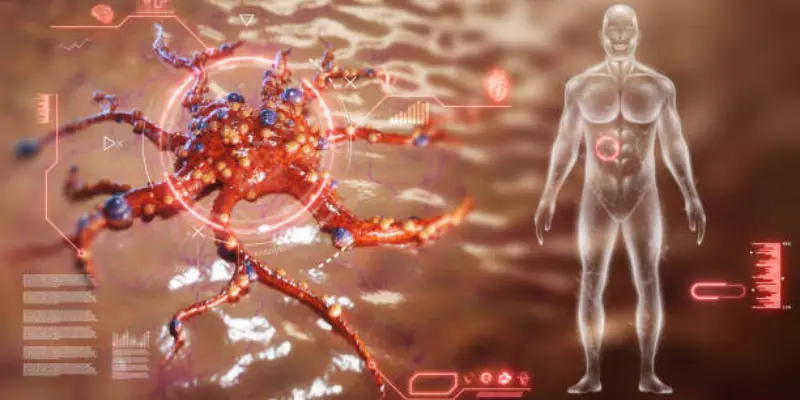AI in Cancer Therapy: How It’s Changing the Way We Treat Cancer
Published: 15 May 2025
“Every year, cancer takes nearly 10 million lives worldwide.” – World Health Organization (WHO)
That’s a big number. But now, something smart is stepping in to help called Artificial Intelligence.
AI is not just for robots or tech geeks. It’s now helping doctors find and treat cancer in faster and smarter ways. From spotting cancer early to picking the right treatments, AI is becoming a game-changer in cancer care. In this post, I will show you how AI in cancer therapy is changing the way we treat cancer and why it matters to all of us.

What Is AI in Simple Words?
AI stands for Artificial Intelligence. That means smart machines or computer programs that can think, learn and solve problems just like us.
You see AI around you every day.
- When your phone unlocks using your face? That’s AI.
- When Netflix shows you movies you might like? That’s AI too.
Now imagine this power being used in hospitals. AI can look at thousands of medical reports, scans and lab results in seconds. It learns what cancer looks like. Then it helps doctors find it faster and treat it better.
Example:
A doctor might take 10–15 minutes to read a scan. AI can do it in seconds and also spot those things which the human eye might miss. It’s like giving doctors super-smart eyes and extra brain power.
Pretty cool, right?
Why We Need AI in Cancer Therapy
Cancer is tough. It doesn’t always show signs early. Sometimes, doctors only find it when it’s already serious. Even then, choosing the right treatment can be hard.
That’s where AI comes in.
| The Challenges We Face |
|---|
|
- Finds cancer early: AI can scan images and spot small changes that even trained eyes might miss.
- Saves time: It can go through thousands of records fast, so doctors don’t have to spend time on papers.
- Suggests better treatment: AI looks at each patient’s history and helps to find the treatment that fits best.
Example:
Some hospitals now use AI to screen mammograms (breast scans). AI has helped doctors in finding the early signs of breast cancer that they might have missed.
How AI Is Used in Cancer Therapy
AI is a smart helper in many parts of cancer care. It supports doctors from the very first step of finding cancer to watching how patients recover. Let’s explore the main ways AI is changing the treatment of cancer.
a. Early Detection and Diagnosis
Detecting cancer early is very important. When caught early, treatment can work better.
AI can look at medical images like X-rays, CT scans and MRIs. It studies tiny details that might be too hard for humans to see. This helps catch cancer sooner.
- AI can also analyze blood tests or tissue samples to find signs of cancer.
- This speeds up diagnosis and helps doctors start treatment earlier.
Example:
Google created an AI tool that looks at mammograms. In tests, this AI found early signs of breast cancer more accurately than some doctors. That means more women get help before cancer grows.
b. Personalized Treatment Plans
Cancer is different for every person. One treatment might help one patient but not another. AI helps by studying a patient’s unique information:
- Their age and general health
- The type and stage of cancer
- Their genes and how their body might react to medicine
Using this information, AI suggests treatment plans tailored to each person. This means doctors can choose the best medicine, dose and schedule.
Example:
IBM Watson for Oncology reads thousands of research papers and patient records. It helps doctors to find treatments that match a patient’s exact condition. This saves time and improves results.
c. Monitoring and Follow-Up
Cancer is such a curse that gives rough time until fully recovered even after treatment starts, thus doctors need to watch how patients are doing.
AI can help by:
- Tracking symptoms and side effects through apps or wearable AI devices
- Analyzing test results to see if cancer is shrinking or growing
- Alerting doctors if there’s a problem or if treatment needs adjusting
This close monitoring helps patients stay safe and get the care they need quickly.
Tip:
Some apps use AI to remind patients when to take medicines or do exercises. They can also send updates to doctors, so patients don’t always need to visit the hospital.

d. Drug Discovery and Research
Making new cancer drugs takes a long time, sometimes many years. Every step in the procedure takes closer look and full attention. The doctor can become exhausted if do it alone.
AI speeds up this process by:
- Studying huge amounts of data from lab tests, patient results and past drug trials
- Finding patterns or new ideas for medicines faster than humans can
This means new treatments can reach patients sooner.
Example:
In one case, AI helped scientists discover a new antibiotic in just a few days, and it’s a process that normally takes months or years. This shows how AI could help to find new cancer drugs quickly too.
Real-Life Success Stories
AI in cancer therapy is not just an idea, it’s already helping people around the world. Here are some real-life examples that show how AI makes a difference.
🌟 Example 1: Early Lung Cancer Detection in the U.S.
In a hospital in the United States, doctors used AI to help find lung cancer early. Lung cancer is hard to spot because it grows silently.
AI looked at CT scans and found tiny spots that could be cancer. This helped doctors catch the disease before it spread. Patients got treatment earlier and many had better chances to heal.
🌟 Example 2: Fighting Cervical Cancer in Rural India
In rural parts of India, many women don’t have easy access to hospitals or specialists.
An AI system was used with simple cameras to take pictures of the cervix. The AI analyzed the pictures and found early signs of cervical cancer or pre-cancer.
This helped health workers screen many women quickly and send only those with concerns to hospitals. It saved time, money and lives.
🌟 Example 3: AI Helping Doctors in Europe
In some European hospitals, AI helps doctors to read thousands of images every day. It reduces mistakes and helps doctors to focus more on patients.
One cancer center reported that AI helped a lot to improve the accuracy in detecting breast and skin cancers, leading to faster treatment.
Common Concerns and Myths
When people hear about AI in cancer cure, they often have questions or worries. Let’s clear up some common doubts.
❓ “Will AI Replace Doctors?”
No way! AI is not here to take over doctors’ jobs. Instead, it helps doctors work better and faster. Think of AI as a helpful assistant that gives doctors more information to make smarter decisions.
❓ “Is AI Always Right?”
AI is very smart but it’s not perfect. Sometimes, it can make mistakes. That’s why doctors always check AI’s suggestions before making any decisions. AI works best when it teams up with human experts.
❓ “Can AI Cure Cancer?”
AI doesn’t cure cancer by itself. But it helps doctors find cancer early, choose the best treatment and track how patients are doing. This makes treatment more effective and improves chances of recovery.
❓ “Is AI Safe to Use?”
Yes, AI tools used in hospitals go through many tests to make sure they are safe. But patients should always talk to their doctors before using any AI-based apps or tools on their own.
Tip for Readers:
If you or a loved one is using AI tools for cancer care, always ask your doctor questions. It’s important to understand how the AI is helping and what the next steps are.
Conclusion
AI is changing the way we fight cancer. It helps doctors find cancer earlier, choose better treatments and watch patients closely. This new technology gives hope to millions of people around the world.
If you or someone you know is affected by cancer, learning about AI’s role in cancer research can make a big difference. The more we understand, the better we can use these tools to save lives.
Want to stay updated on how AI and technology are changing healthcare? Follow our website for easy-to-understand blogs, tips and stories about the future of cancer care.
Together, we can make the fight against cancer stronger and smarter!
Related queries About AI in Cancer Therapy
Here are frequently asked questions about AI’s role in cancer cure:
AI cancer detection costs vary by hospital and country but are becoming more affordable with wider adoption. Many insurance companies now cover AI-assisted diagnostics. The initial investment is often offset by earlier detection and more efficient treatment.
No special knowledge is required from patients to benefit from AI in cancer care. Your doctor will handle the technical aspects and explain results in simple terms. You will receive care just as usual but with potentially better outcomes.
Studies show AI can match or exceed experienced oncologists in specific tasks like analyzing certain scans. However, AI works best as a supplement to human expertise, not a replacement. The highest accuracy comes from combining AI analysis with doctor review.
Medical data used with AI systems is protected by the same privacy laws as other health information. Hospitals use security measures to keep your information private and safe. Many AI systems can analyze your data without storing personal details.
AI systems require thousands of images and patient records to learn effectively. Most medical AI undergoes months or years of training and testing. Once deployed, many AI systems continue learning and improving over time.
AI can be particularly valuable for rare cancers where human expertise is limited. By analyzing global cases, AI can identify patterns that might be missed otherwise. However, rarer cancers may have fewer training examples, potentially affecting accuracy.
Ask if AI tools are being used in your diagnosis or treatment planning. Inquire about how AI recommendations factor into your overall care plan. Request information about success rates for similar cases using these technologies.
AI currently has limitations with certain uncommon cancers or unusual presentations. Some complex or highly variable cancers may still rely more heavily on human expertise. As technology advances, these gaps are steadily narrowing.
Many hospitals have programs where patients can volunteer to share their anonymized data for AI research. Patient advocacy groups often provide information about clinical trials involving AI. Simply asking your doctor about research opportunities is a good starting point.
AI aims to enhance personalization, not replace human connection in cancer care. Doctors use the time saved by AI for more meaningful patient interactions. The technology handles data analysis while healthcare providers focus on compassionate care.





